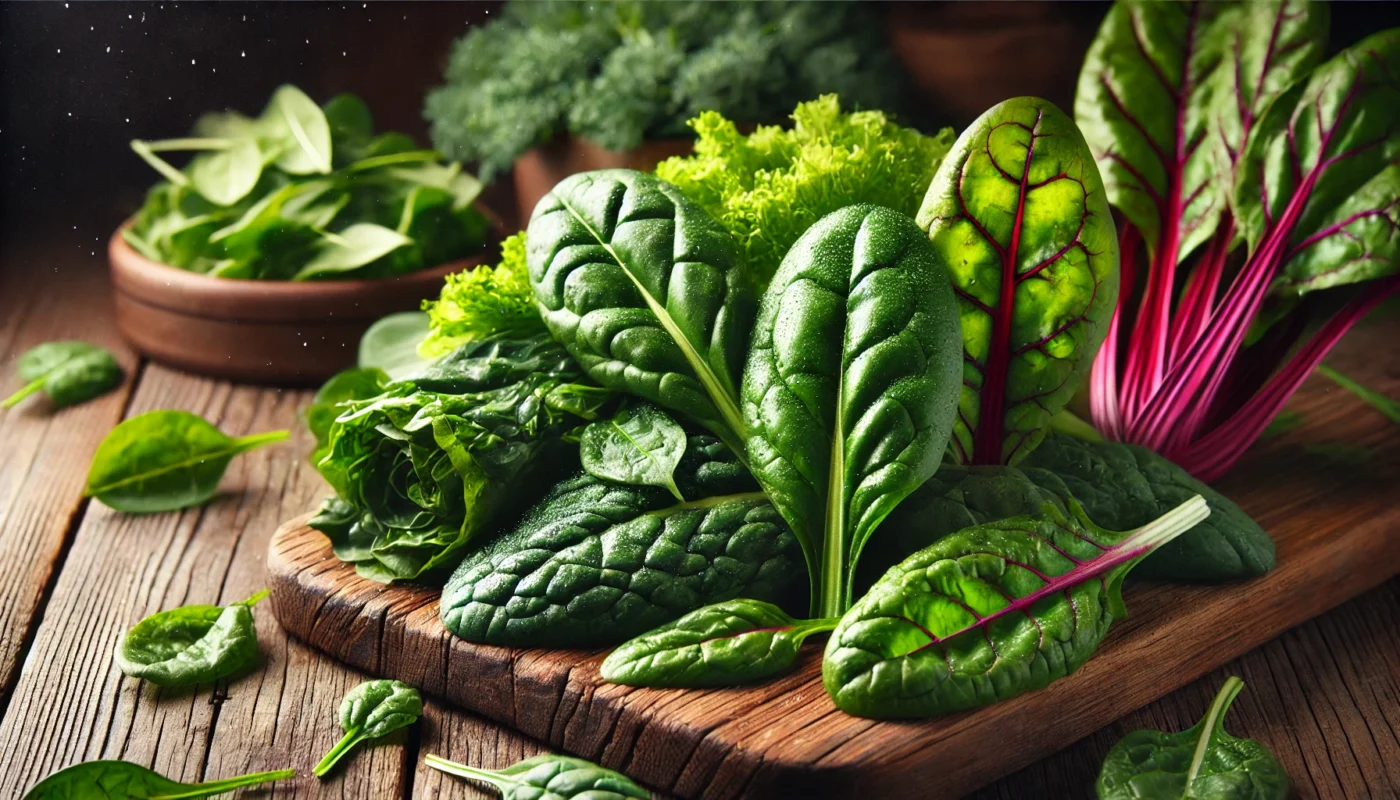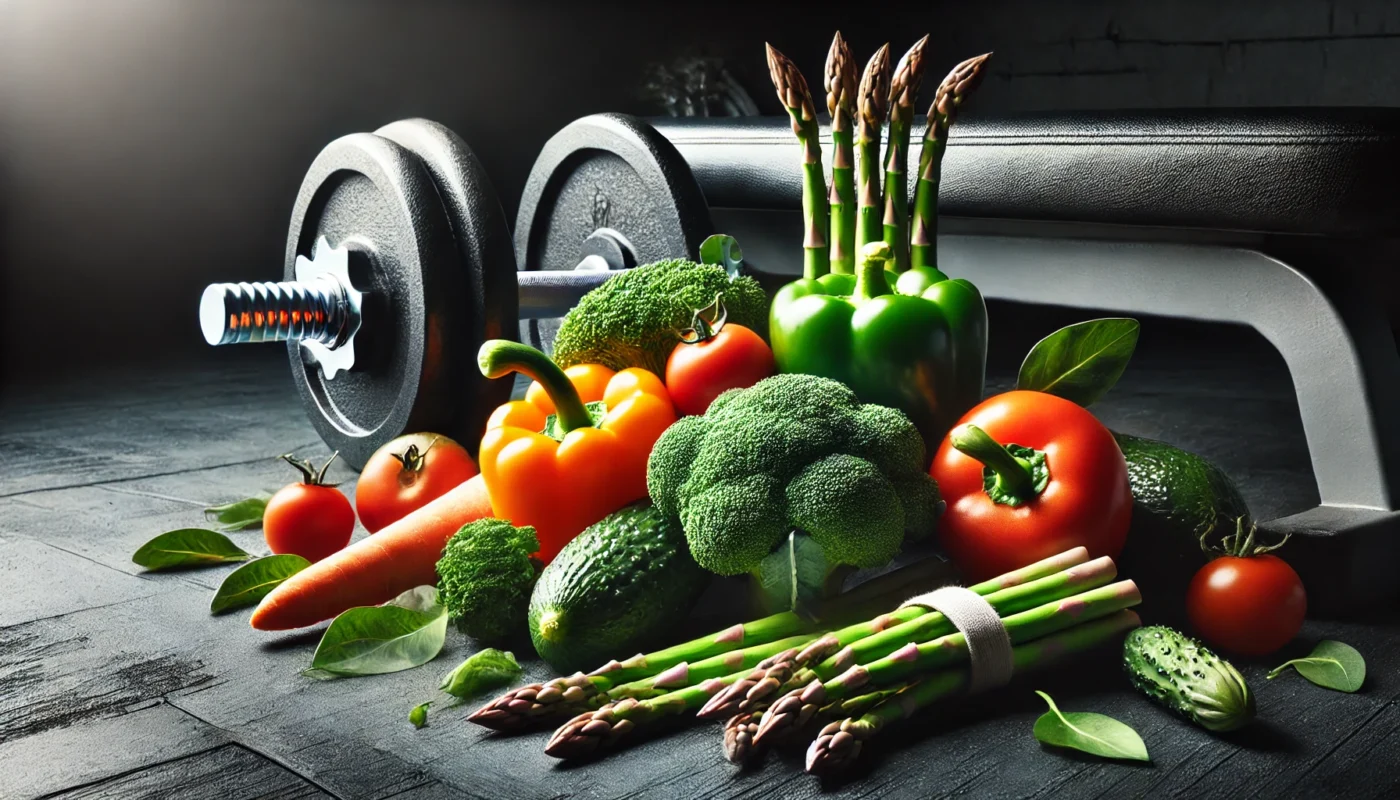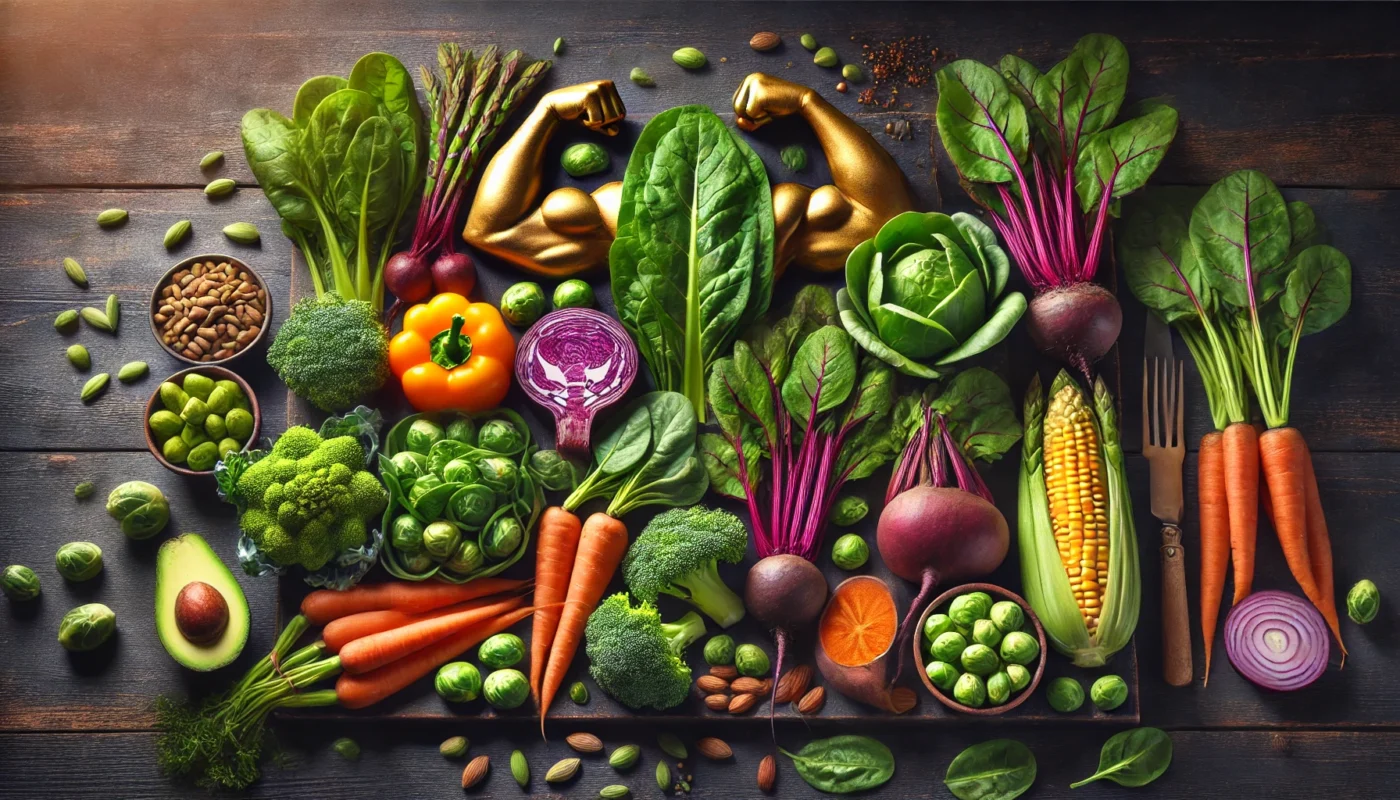When it comes to building muscle, the spotlight often shines on proteins like chicken, fish, and whey. However, vegetables play an equally crucial role in muscle development, enhancing your diet with essential nutrients that aid in muscle growth and overall health. In this article, we’ll explore the top vegetables for boosting muscle growth, offering insights into how these nutrient powerhouses can aid your fitness journey.
You may also like: High Protein Foods to Fuel Workouts

Why Vegetables Matter for Muscle Growth
Vegetables are not just side dishes; they are packed with vitamins, minerals, and antioxidants that support various physiological functions necessary for muscle growth. They provide a rich source of micronutrients that enhance performance, facilitate recovery, and sustain energy levels. Incorporating vegetables into your diet can help improve muscle function, aid in protein synthesis, and reduce inflammation.
The Micronutrient Advantage
While macronutrients like proteins, fats, and carbohydrates are essential for muscle building, micronutrients derived from vegetables are vital for optimal muscle function and recovery. These nutrients assist in numerous enzymatic reactions within the body, playing a critical role in energy production and muscle repair. Moreover, they help to maintain a robust immune system, which is crucial for athletes and fitness enthusiasts who undergo intense physical stress.
Antioxidant Powerhouses
Antioxidants found in vegetables are crucial for reducing oxidative stress, a common byproduct of intense exercise that can lead to muscle fatigue and damage. By neutralizing free radicals, antioxidants help to protect muscle fibers and promote quicker recovery, ensuring that muscles can repair and grow stronger after workouts. Vegetables high in antioxidants, such as spinach and kale, are particularly beneficial for those looking to enhance their muscle recovery and growth.
Inflammation Reduction
Inflammation is a natural response to muscle exertion and injury, but chronic inflammation can hinder muscle growth and recovery. Vegetables are rich in anti-inflammatory compounds that help to reduce this inflammation, allowing for better muscle repair and growth. By incorporating vegetables into your meals, you can minimize the negative effects of inflammation, leading to more efficient muscle building and overall improved performance.
Top Vegetables for Building Muscle
Spinach
Spinach is often associated with strength, and rightly so. This leafy green is rich in iron, calcium, and nitrates. Iron is crucial for oxygen transport in the blood, enhancing muscle endurance. Calcium supports muscle contractions, while nitrates improve blood flow, boosting exercise performance.
Iron: The Oxygen Carrier
Iron plays a pivotal role in transporting oxygen to the muscles, which is essential for sustaining energy levels during workouts. By increasing oxygen availability, iron helps delay fatigue and improve endurance, allowing for more extended and more effective training sessions. Incorporating spinach into your diet ensures that your muscles receive adequate oxygen, promoting better performance and growth.
Calcium and Muscle Contractions
Calcium is not only vital for bone health but also plays a crucial role in muscle contractions. During exercise, calcium ions are released into muscle cells, triggering the contraction process. Consuming calcium-rich vegetables like spinach supports this process, ensuring that your muscles can contract efficiently and effectively during workouts.
Nitrates for Enhanced Blood Flow
Nitrates, naturally occurring compounds found in spinach, are known to improve blood flow and reduce the oxygen cost of exercise. By converting to nitric oxide in the body, nitrates help dilate blood vessels, enhancing circulation and delivering more oxygen and nutrients to the muscles. This improved blood flow can lead to better exercise performance and increased muscle growth.
Broccoli
Broccoli is a powerhouse of vitamin C, fiber, and sulforaphane. Vitamin C is an antioxidant that helps repair tissues and reduce muscle soreness post-exercise. Sulforaphane is known for its anti-inflammatory properties, which aid in muscle recovery and growth.
Vitamin C for Tissue Repair
Vitamin C is essential for the synthesis of collagen, a structural protein that aids in tissue repair and maintenance. After intense exercise, muscles undergo micro-tears that require repair for growth. By consuming vitamin C-rich vegetables like broccoli, you support the body’s natural repair processes, leading to faster recovery and muscle development.
Fiber and Digestive Health
Fiber is an important component of a muscle-building diet as it aids in digestion and nutrient absorption. A healthy digestive system ensures that your body can efficiently absorb the nutrients needed for muscle growth. Broccoli’s high fiber content helps maintain digestive health, promoting better nutrient assimilation and overall muscle development.
Sulforaphane and Inflammation
Sulforaphane, a compound found in broccoli, has potent anti-inflammatory properties that help reduce muscle inflammation after exercise. By minimizing inflammation, sulforaphane supports quicker recovery and enhances the muscle-building process. Incorporating broccoli into your diet can help you take advantage of these benefits, promoting better muscle health and growth.
Kale
Kale is a nutrient-dense vegetable packed with vitamins A, K, and C. Vitamin K plays a significant role in bone health, which is essential for supporting increased muscle mass. The antioxidants in kale help combat oxidative stress, promoting better recovery and muscle growth.
Vitamin A for Immune Support
Vitamin A is essential for maintaining a healthy immune system, which is crucial for athletes and fitness enthusiasts. A strong immune system helps prevent illness and infection, ensuring that you can train consistently and reach your muscle growth goals. Kale, rich in vitamin A, supports immune health and overall wellness.
Bone Health with Vitamin K
Vitamin K is vital for bone health, playing a role in bone mineralization and calcium regulation. Strong bones provide a stable foundation for muscle growth and development. By consuming vitamin K-rich vegetables like kale, you support bone health, enhancing your body’s ability to sustain increased muscle mass.
Antioxidant Benefits
Kale is rich in antioxidants that help combat oxidative stress, a common issue for those engaging in intense physical activity. By reducing oxidative damage, antioxidants promote quicker recovery and support muscle growth, ensuring that you can train effectively and achieve your fitness goals.
Sweet Potatoes
Sweet potatoes are an excellent source of complex carbohydrates, providing the energy needed for intense workouts. They also contain beta-carotene, which converts to vitamin A, supporting immune function and muscle repair.
Complex Carbohydrates for Energy
Complex carbohydrates are a vital energy source for athletes and bodybuilders. Sweet potatoes provide a steady release of energy, ensuring that you have the endurance and stamina needed for demanding workouts. By including sweet potatoes in your diet, you can maintain high energy levels, supporting better performance and muscle growth.
Beta-Carotene and Vitamin A
Beta-carotene, found in sweet potatoes, converts to vitamin A in the body. This nutrient is crucial for immune function and muscle repair, supporting your body’s ability to recover and grow stronger after exercise. By consuming beta-carotene-rich vegetables, you promote better recovery and overall muscle health.
Sustained Energy for Workouts
The complex carbohydrates in sweet potatoes offer a slow and steady release of energy, preventing the spikes and crashes associated with simple sugars. This sustained energy helps you maintain focus and intensity during workouts, ensuring that you can train effectively and achieve your muscle growth goals.
Brussels Sprouts
Brussels sprouts are rich in fiber, vitamins C and K, and antioxidants. These nutrients help reduce inflammation, improve digestion, and enhance muscle recovery. The high fiber content aids in maintaining a healthy weight, which is crucial for muscle building and fat loss.
Fiber for Weight Management
Fiber plays a crucial role in weight management by promoting feelings of fullness and reducing overall calorie intake. Maintaining a healthy weight is important for muscle building, as excess body fat can hinder muscle definition and growth. By incorporating fiber-rich vegetables like Brussels sprouts into your diet, you can support healthy weight management and muscle development.
Vitamin C and Muscle Recovery
Vitamin C, found in Brussels sprouts, aids in tissue repair and muscle recovery, reducing soreness and fatigue after workouts. By supporting the body’s natural recovery processes, vitamin C helps you train consistently and effectively, promoting better muscle growth and development.
Antioxidants and Inflammation
Antioxidants in Brussels sprouts help reduce inflammation and oxidative stress, common issues for those engaging in regular exercise. By minimizing these effects, antioxidants support quicker recovery and enhanced muscle growth, ensuring that you can train consistently and reach your fitness goals.

Do Vegetables Really Help Build Muscle?
There’s a common misconception that only protein-rich foods contribute to muscle growth. While proteins are vital, vegetables provide complementary nutrients that optimize the muscle-building process. This section will explore scientific research supporting the role of vegetables in muscle growth and how they enhance the effects of protein and exercise.
The Science Behind Vegetables and Muscle Growth
Research indicates that diets rich in vegetables improve muscle health due to their high antioxidant content and ability to reduce inflammation. Antioxidants protect muscles from damage during intense workouts, while anti-inflammatory compounds speed up recovery. Studies show that individuals consuming a variety of vegetables experience better muscle function and growth than those with limited vegetable intake.
Antioxidants and Muscle Protection
Scientific studies have highlighted the protective effects of antioxidants on muscle tissue during exercise. By reducing oxidative damage, antioxidants help preserve muscle integrity, promoting better recovery and growth. These findings underscore the importance of incorporating antioxidant-rich vegetables into your muscle-building diet.
Anti-Inflammatory Benefits
Research has also demonstrated the anti-inflammatory benefits of certain vegetables, which can enhance muscle recovery and growth. By reducing chronic inflammation, these vegetables support quicker healing and improved muscle function. Including anti-inflammatory vegetables in your diet can help optimize your muscle-building efforts.
Enhanced Protein Utilization
Vegetables can also enhance the body’s ability to utilize protein, a crucial factor in muscle growth. By providing essential vitamins and minerals, vegetables support the metabolic processes necessary for protein synthesis. This synergistic effect between vegetables and protein highlights the importance of a balanced diet for muscle development.
Incorporating Vegetables into Your Muscle-Building Diet
Incorporating vegetables into your diet doesn’t have to be a chore. Here are practical tips to boost your vegetable intake for muscle growth:
- Smoothies: Add spinach or kale to your morning smoothie for an easy nutrient boost.
- Stir-Fry: Create a colorful stir-fry with broccoli, bell peppers, and Brussels sprouts for a nutritious meal.
- Salads: Make hearty salads with a mix of leafy greens, sweet potatoes, and your choice of protein.
- Roasted Veggies: Roast a variety of vegetables like carrots, Brussels sprouts, and zucchini for a tasty side dish.
Creative Vegetable Recipes
Explore creative recipes that make vegetables a delicious and integral part of your meals. Try experimenting with vegetable-based soups, casseroles, and curries, incorporating a variety of flavors and textures. By diversifying your vegetable dishes, you can enjoy the nutritional benefits while satisfying your taste buds.
Meal Planning for Success
Effective meal planning can help you consistently incorporate vegetables into your diet. Plan your meals around seasonal vegetables, taking advantage of their peak flavors and nutritional content. By organizing your meals ahead of time, you can ensure a balanced intake of vegetables, supporting your muscle growth and overall health goals.
Balancing Vegetables with Protein
To maximize muscle growth, balance your vegetable intake with adequate protein sources. Pairing vegetables with lean meats, legumes, or plant-based proteins ensures you receive all necessary nutrients for muscle building. This approach not only supports muscle growth but also enhances overall health and wellbeing.
Ensuring Nutrient Diversity
Variety is key when it comes to vegetable consumption. Aim to include a wide range of colors and types of vegetables in your diet to ensure a diverse intake of nutrients. This diversity will help you take full advantage of the health benefits vegetables offer, supporting muscle growth and overall wellness.

Conclusion
Vegetables are indispensable in a muscle-building diet, providing essential nutrients that enhance performance, recovery, and overall health. By incorporating a variety of these powerhouse vegetables into your meals, you can support your muscle growth goals while reaping the myriad health benefits they offer. Embrace these vegetables as key components of your nutrition strategy, and watch your muscles thrive.
Remember, a balanced diet rich in diverse vegetables and protein sources, combined with regular exercise, is the key to successful muscle growth and improved wellness. Embrace the full spectrum of nutrients these vegetables offer, and let them power your path to peak performance.
Embracing a Holistic Approach
Adopting a holistic approach to nutrition involves recognizing the complementary roles of different food groups in muscle building. By valuing the contributions of vegetables alongside proteins, you create a balanced diet that supports both your fitness and health goals. This comprehensive approach ensures that you achieve optimal muscle growth and overall wellbeing.
Long-term Health Benefits
In addition to supporting muscle growth, a diet rich in vegetables offers long-term health benefits, including reduced risk of chronic diseases and improved mental health. By prioritizing vegetable intake, you not only enhance your physical performance but also invest in your overall health and longevity.
Setting Achievable Goals
Set realistic and achievable nutrition goals that include increasing your vegetable intake. By gradually incorporating more vegetables into your diet, you can develop sustainable habits that support your muscle-building journey. Remember, consistency is key, and every small step towards a balanced diet contributes to your ultimate fitness success.
muscle growth, vegetables, nutrition, protein, antioxidants, anti-inflammatory, meal planning, healthy eating, fitness, recovery, nutrient diversity, holistic approach, long-term health benefits, achievable goals
Further Reading:
Cruciferous Vegetables Optimise Muscle Growth, Research Suggests
The 25 Best Muscle Building Foods
8 Reasons to Add More Vegetables to Your Bulking Diet
Important Note: The information contained in this article is for general informational purposes only, and should not be construed as health or medical advice, nor is it intended to diagnose, prevent, treat, or cure any disease or health condition. Before embarking on any diet, fitness regimen, or program of nutritional supplementation, it is advisable to consult your healthcare professional in order to determine its safety and probable efficacy in terms of your individual state of health.
Regarding Nutritional Supplements Or Other Non-Prescription Health Products: If any nutritional supplements or other non-prescription health products are mentioned in the foregoing article, any claims or statements made about them have not been evaluated by the U.S. Food and Drug Administration, and such nutritional supplements or other health products are not intended to diagnose, treat, cure, or prevent any disease.

